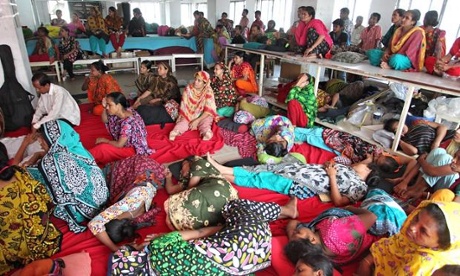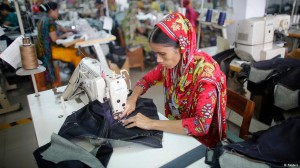
When the tragic event of Bangladesh’s Rana Plaza building collapsed in April 2013, resulting in the deaths of more than 1,100 garment workers, the veil masking fashion’s dirty secrets was stripped away. Suddenly, people demanded to know what was going on with the garment industry and workers’ safety, people questioned conditions, fair wages, building safety, and sustainability became a key motivator for change.
Young people make up a large percentage of the demographic that is pushing for transparency and change. They read labels on their T-shirts and denim; they ask questions behind the story of the brand; and they are spending differently. As we’ve revealed in our 3rd Annual Sustainability and the State of the Future Youth Culture Study 2014, released on Tuesday, August 12, 2014, there’s no going back to less green or less safe in terms of workers’ conditions. Fair trade fashion and sustainability are at the forefront for the future.
That’s why when VF Corporation, owners of The North Face, Wrangler, Vans, Timberland, Jansport, and others revealed their latest progress regarding their steps as members of the Alliance for Bangladesh Worker Safety, it brings up the still larger question of where were they before the tragedy struck?
The more you read into their progress report and that of the Alliance overall, the clearer it gets about just how bad the garment industry had been for years previously. Obviously, it’s important to hear the progress, but it also show just how far the fashion and footwear industry have left to go. And this is just in Bangladesh.

Here’s VF Corporations statement:
VF Corporation (NYSE:VFC) today provided a progress update regarding continuing actions to improve the safety and working conditions at its contract suppliers’ manufacturing sites in Bangladesh. This announcement follows the publication of the first Annual Report of The Alliance for Bangladesh Worker Safety.
VF is a founding member of the Alliance for Bangladesh Worker Safety (Alliance), a legally binding, five-year commitment to transparent, results-oriented, measurable and verifiable actions to improve the safety of the Bangladeshi ready-made garment factories. The Alliance is comprised of 26 North American apparel and retail companies.
During the past 13 months, VF, in collaboration with the Alliance, has made measurable progress in the areas of factory inspections and repairs, and worker training and empowerment initiatives, in addition to providing significant financial resources to ensure worker support and safety.
“At VF, the safety of our associates and the people who make our products around the world is a priority and we are putting our human and financial resources behind our commitment,” said Eric Wiseman, chairman, president and CEO of VF. “We are proud of our recent accomplishments and those of the Alliance in Bangladesh, but there is still much work to be done. We will continue to collaborate with The Alliance for Bangladesh Worker Safety and with the Bangladeshi government, labor unions, garment workers, factory owners and other like-minded organizations to make the factories in Bangladesh safer for all workers.”
As a member of the Alliance for Bangladesh Worker Safety and through its independent actions, VF has pledged to spend at least $17 million in the near-term to improve working conditions in Bangladesh. First-year accomplishments of the Alliance include:
Factory Inspections
- Developed and implemented Bangladesh’s first coordinated Fire Safety and Structural Integrity Standard;
- Identified and hired seven professional local companies to serve as Qualified Assessment Firms to conduct independent inspections;
- Inspected 100 percent of the 587 factories producing product for Alliance members;
- Began ongoing publication of all factory inspection reports and Corrective Action Plans to Alliance website; and,
- Recommended the closure or partial closure 10 unsafe factories.
Training
- Developed the Alliance Basic Fire Safety Training module;
- Trained more than one million workers and managers in basic fire safety; and,
- Hosted the country’s first-ever International Trade Expo for Building and Fire Safety in Dhaka with nearly 3,000 vendors, factory owners and safety experts to increase access to affordable, high-quality safety equipment and expertise.
Financial Support
- Alliance members backed over $100 million in capital for their respective supply chains to make safety improvements;
- Provided several finance options including short- to medium-term loan guarantees through the International Finance Corporation and supply chain-based financing;
- Formalized direct loans to factories to undertake remediation;
- Successfully advocated to the Bangladeshi government to eliminate tariffs on key safety equipment, making critical items significantly more affordable;
- Doubled the duration of compensation provided to displaced workers from two to four months; and,
- Disbursed wages to approximately 1,000 workers displaced by factory remediation to date.
Worker Empowerment
- Conducted the largest-ever worker survey in Bangladesh with more than 3,200 workers;
- Conducted a follow-up limited sample survey with 683 randomly selected workers to assess progress in worker awareness;
- Established an Alliance Worker Helpline piloted in 50 factories;
- Appointed three prominent Bangladeshi labor leaders to the Alliance’s Board of Advisors;
- Created a Board committee dedicated exclusively to labor issues comprised of seven trade union leaders;
- Invited worker representatives to be part of the factory inspection process and shadow assessments; and,
- Amended the Alliance Members Agreement to include a worker’s right to refuse unsafe work.
To learn more about the accomplishments of the Alliance for Bangladesh Worker Safety, visit www.BangladeshWorkerSafety.org.


